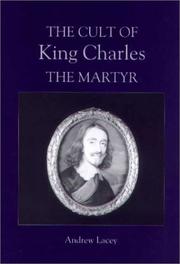| Listing 1 - 1 of 1 |
Sort by
|

ISSN: 14646625 ISBN: 0851159222 9786610545100 1280545100 1846150604 9780851159225 9781846150609 Year: 2003 Volume: 7 Publisher: Suffolk : Boydell & Brewer,
Abstract | Keywords | Export | Availability | Bookmark
 Loading...
Loading...Choose an application
- Reference Manager
- EndNote
- RefWorks (Direct export to RefWorks)
The cult of King Charles the Martyr did not spring into life fully formed in January 1649. Its component parts were fashioned during Charles's captivity and were readily available to preachers and eulogists in the weeks and months after the regicide. However, it was the publication of the 'Eikon Basilike' in early February 1649 that established the image of Charles as a suffering, innocent king, walking in the footsteps of his Saviour to his own Calvary at Whitehall. The figure of the martyr and the shared set of images and beliefs surrounding him contributed to the survival of royalism and Anglicanism during the years of exile. With the Restoration the cult was given official status by the annexing of the Office for the 30th January in the 'Book of Common Prayer' in 1662. The political theology underpinning the cult and a particular historiography of the Civil Wars were presented as the only orthodox reading of these events. Yet from the Exclusion Crisis onwards dissonant voices were heard challenging the orthodox interpretation. In these circumstances the cult began to fragment between those who retained the political theology of the 1650s and those who sought to adapt the cult to the changing political and dynastic circumstances of 1688 and 1714. This is the first study to deal exclusively with the cult and takes the story up until 1859, the year in which the Office for the 30th January was removed from the 'Book of Common Prayer'. Apart from discussing the origins of the cult in war, revolution and defeat it also reveals the extent to which political debate in the late seventeenth and early eighteenth centuries was conducted in terms of the Civil Wars. It also goes some way to explaining the persistence of conservative assumptions and patterns of thought. ANDREW LACEY is currently Special Collections Librarian, University of Leicester, and College Librarian, Trinity Hall, Cambridge.
Christian martyrs --- Christian saints --- Charles --- Cult --- Church of England. --- Great Britain --- Kings and rulers --- Biography --- Cult. --- Saints --- Canonization --- Charles Ier, roi d'Angleterre --- United Church of England and Ireland. --- Christian martyrs - Great Britain - Biography --- Christian saints - Great Britain - Biography --- Charles - I, - King of England, - 1600-1649 - Cult --- Great Britain - Kings and rulers - Biography --- Charles - I, - King of England, - 1600-1649
| Listing 1 - 1 of 1 |
Sort by
|

 Search
Search Feedback
Feedback About
About Help
Help News
News